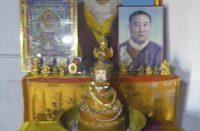High Peaks Pure Earth has translated a blogpost by Woeser written in September 2012, for the Tibetan service of Radio Free Asia and published on her blog on January 9, 2013. The post focuses on recent increased measures to “maintain stability” in Tibet Autonomous Region, also noticed by Human Rights Watch as detailed at length in their report of March 20: Alarming New Surveillance, Security in Tibet.
At the end of the piece, Woeser quotes from Tibetologist Charlene Makley’s essay “The Political Lives of Dead Bodies”, taken from a special issue of the academic journal Cultural Anthropology focusing on the self-immolations in Tibet. Please follow the links to read the full essay.
According to reports from official Chinese media: at the end of 2011, 135 police service stations were established in Lhasa, the distributed equipment amounted to 60 million Yuan. Including Lhasa, in the entire Tibetan region, 676 such stations have been established. (Photos downloaded from the internet)
“Changing From a Military Uniform Into a Police Uniform”
By Woeser
Over the past few days in Lhasa, another batch of Armed Police and People’s Liberation Army soldiers took the exam for grassroots police positions in the Tibet Autonomous Region.
This must be the second time that a group of soldiers that are about to retire from their former posts are being recruited. At the end of last year, official media in the Tibet Autonomous Region reported that “686 soldiers retired from the main forces of the Armed Police in Tibet (…) and passed the entrance exam for grassroots police positions in the Tibet Autonomous Region (…) this is the first time that our region is recruiting retired soldiers.” The report also emphasised that those armed police have previously taken part in the mission to “maintain stability” in Tibet, to use official government terminology, and that they also have perfect mastery of politics. As a result, their pay is quite good, “all the recruited personnel will enjoy their full pensions, which is calculated according to the time they have served in the army”. Afterwards “these people were sent to grassroots police stations belonging to Public Security Bureaus of all levels and ranks, to security checkpoints all across the region and to the Lhasa police’s SWAT troops or to police service stations.”
However, according to an announcement by the human resource examination website of Tibet – “2011 Tibet Autonomous Region Announcement for Admissions to the grassroots Public Security Bureau’s Police Entrance Examination for About to Retire or already Retired Soldiers” – one can see the total amount of such people was actually 2500: “For this year’s entrance examination we plan to recruit 2500 people (2485 men and 15 women). Out of those: 1800 are about to retire, and 700 have already retired.” Recruited are soldiers from the “Liberation Army stationed in Tibet, from the PRC Armed Police Forces (as well as still active personnel from Public Security Forces).” As for the conditions to enter the exam, the first clause of the first article says “firm political standpoint”, and emphasises that “people who are themselves or who are related to people that undermine the political power of our country inside or outside of China” are not allowed to enter the exam. Of course, Party members or people with outstanding achievements will get extra points.
Recruiting police forces from the PLA and the Armed Forces stationed in Tibet is clearly a new measure to “maintain stability” in Tibet. According to some information, the written exam paper and questions for this examination are different from those of graduates taking the civil servant examination. Firstly, they are much more simple and secondly, they are much more political, specifically putting emphasis on “going against splittism” in Tibet. In the 2012 conditions for the same examination, they clearly request “the firm implementation of the Party’s political route, guidelines, and policies; to fully adhere to the Party Central Committee regarding ideology, politics, and action; and to have a clear political standpoint regarding fighting against splittism, criticising the Dalai Lama, and defending the country’s and people’s unity.”
According to someone with inside knowledge, soldiers serving in Tibet have all been very happy about this new policy because it essentially helps their own future. For soldiers from the city and the countryside, it is equally becoming increasingly difficult to find a stable job after they return home at the end of their service. This new policy clearly solves this problem, and the time limit for this service is 8 years; so now, the military camps resemble a wild goose chase, everyone wants to take the exam. Of course, the majority of people being admitted are Han Chinese.
For the local authorities, recruiting people that have been “maintained stable” and “brainwashed” inside the military camps is much more convenient than recruiting people from other groups, even though it is ultimately merely a change in the colour of uniform. Having such high numbers of police officers with “firm political standpoints” and “high military calibre” means that police service stations officially exist for “people’s convenience” but actually exist to “maintain stability” cover the whole region like a dragnet, with Lhasa alone already being home to 136 such service stations and with 676 existing in the whole Autonomous Region.
Official media describes these newly established police service stations as “combining patrolling by car and on foot in one, 24 hours of uninterrupted patrolling, gathering all efforts to ‘show policemen during day-time and police lights at night’, making sure that there is no dead angle or blind spot.” The Tibetologist Charlene Makley said about the Tibet: “As I found in 2008, the military crackdown on Tibetan protest institutionalized the CCP’s state of exception in a state of siege targeting not a specific enemy but entire towns and districts (…) extend(ing) the state of siege from its previously quasi-hidden status (the occasional unwise dissident) to the everyday lives of all.”
September 2012, Lhasa







Follow Us!